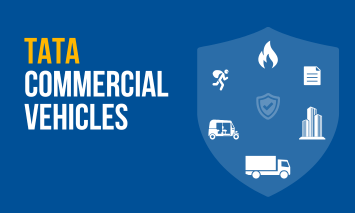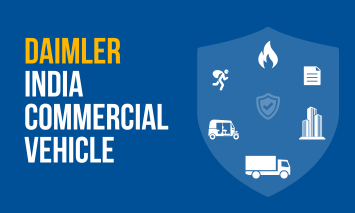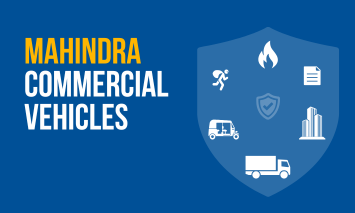Commercial Vehicle Tax
Mar 28, 2025 • 3 Min Read
Commercial vehicles are the lifeblood of our economy, transporting goods and services across cities and states. However, owning and using these comes with a responsibility – paying commercial vehicle tax. This tax contributes to road maintenance, infrastructure development, and other services that benefit all drivers. This guide will untangle the complexities of commercial vehicle tax, helping you understand what it is, who needs to pay it, and how the process works. So, buckle up and get ready for a smooth ride through the world of commercial vehicle taxation!
Understanding Commercial Vehicle Tax
In India, commercial vehicle tax refers to the levy imposed by the state governments on vehicles used for commercial purposes. Here's a breakdown of the key aspects of commercial vehicle tax:
- Tax applies to all vehicles used for commercial purposes, including trucks, buses, taxis, auto-rickshaws, and goods carriers.
- It is typically based on factors such as vehicle type, engine capacity, seating capacity, and usage (inter-state or intra-state). The tax may be levied as a one-time fee during vehicle registration or as an annual recurring tax.
- Different states have their own tax rates and calculation methodologies, which may also vary based on whether the vehicle is used for goods transport or passenger transport.
- Tax can be paid either online through state transport department portals or offline at designated RTO (Regional Transport Office) counters.
- Certain categories of commercial vehicles may be eligible for tax exemptions or concessions based on factors such as vehicle age, usage (e.g., electric vehicles), or government schemes promoting public transport or eco-friendly vehicles.
Understanding commercial vehicle tax regulations is crucial for commercial vehicle owners and operators to ensure compliance with applicable laws and regulations and to manage their operational costs effectively.
Taxation Overview
Here's a breakdown of commercial vehicle tax in India:
State-Specific: Commercial vehicle tax is levied by the state government where the vehicle is registered. Rates and regulations can vary considerably from state to state.
Tax Factors: Road tax for commercial vehicles is calculated based on a combination of factors:
- Vehicle Type: (trucks, buses, tempos, etc.)
- Gross Vehicle Weight (GVW): Higher GVW usually leads to higher taxes.
- Number of Axles: Vehicles with more axles generally have higher tax rates.
- Fuel Type: Some states have different tax rates for diesel and CNG vehicles.
- Permit Type: Inter-state permits might cost more than intra-state permits.
To understand the exact commercial vehicle tax structure for your state, it's recommended to check the official website of your state's transport department. They'll have the most up-to-date information on tax slabs, exemptions, and payment procedures.
Tax Implications for Businesses
Financial Implications:
- Direct Cost: Road tax for commercial vehicles is a significant expense for businesses. The tax amount can vary depending on factors like vehicle type, GVW, and state regulations. This can impact cash flow and budgeting.
- Planning and Budgeting: Understanding the tax structure and planning for upcoming tax payments is crucial. Unexpected tax bills can disrupt financial stability.
Operational Considerations:
- Permit Requirements: Depending on the type of operation and routes used, businesses might need various permits (interstate, special permits) in addition to the base tax. Each permit might have additional costs.
- Timely Renewals: Failure to pay tax or renew permits on time can lead to penalties and vehicle confiscation, disrupting business operations.
- Route Planning: Tax structures can vary by state. Businesses with multi-state operations need to consider tax implications when planning routes to minimise the overall tax burden.
Tax Benefits (Potential):
- Depreciation: The cost of acquiring a commercial car road tax can be depreciated over its useful life, reducing taxable income.
- Fuel Efficiency Incentives: Some states might offer tax breaks for vehicles with cleaner fuel technologies like CNG.
- GST Claims: If your company operates with GST, you can also claim returns on your commercial vehicle when purchasing with full payment.
Managing Commercial Vehicle Tax
- Stay Informed: Keeping up-to-date on current tax regulations and potential changes in your state is crucial.
- Record Keeping: Maintain accurate records of vehicle purchases, permits, and tax payments for easier compliance and potential future deductions.
- Tax Planning Strategies: Consult with a tax advisor to explore potential tax benefits and deductions related to commercial car road tax and their operation.
Additional Considerations
- Toll Taxes: Separate from commercial vehicle tax, toll taxes are user fees collected at checkpoints on highways and expressways. Factor these into your overall transportation costs.
- Fuel Costs: Fuel prices can significantly impact operational costs. Depending on your business needs, consider fuel efficiency and potential alternative fuel options.
Tax Tips for Commercial Vehicles
Commercial vehicle tax is an unavoidable expense, but there are ways to keep it under control. Here are some tips to help you optimise your commercial vehicle tax burden:
- Stay Informed: Regularly check your state's transport department website for updates on tax rates, exemptions, and changes in regulations.
- Plan Your Fleet: Analyse your business needs and choose the most fuel-efficient and tax-friendly vehicle types for your operations. Consider alternative fuels like CNG if tax incentives are offered.
- Optimise GVW: Adjust your loading strategies to stay within lower GVW brackets for tax savings. However, prioritise safety and avoid overloading your vehicles.
- Utilise Permit Exemptions: Explore exemptions for specific vehicle types or routes that might apply to your business.
- Timely Renewals: Set calendar reminders or automate the process to avoid penalties for late tax payments or permit renewals.
- Maintain Records: Keep meticulous records of vehicle purchases, permits, maintenance costs, and fuel expenses. This can help claim potential deductions and depreciation benefits when filing taxes.
- Consult a Tax Advisor: A qualified tax professional can analyse your specific situation and identify potential tax optimisation strategies for your commercial vehicles.
Conclusion
Commercial vehicle tax is a reality for businesses operating with these essential workhorses. However, by understanding the tax structure, exploring optimisation strategies, and maintaining good record-keeping practices, you can minimise the financial impact and ensure the smooth operation of your commercial fleet. Royal Sundaram offers comprehensive commercial vehicle insurance plans to protect your trucks, tempos, and buses against accidents, theft, and damages.
Our focus on customer service and a network of authorised workshops can streamline the claims process.



Discover the perfect insurance plan for you!
Get your free quote now!
Get StartedBy Clicking on Get Started, You agree to our Terms and Conditions and override DNC/NDNC registration.
More like this
View more





